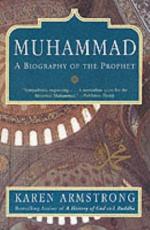
|
| Name: _________________________ | Period: ___________________ |
This test consists of 15 multiple choice questions and 5 short answer questions.
Multiple Choice Questions
1. What is Jahiliyah used to describe?
(a) Arab society during Muhammad's period of preaching.
(b) Arab society after Muhammad's death.
(c) Arab society after Khadija's death.
(d) Arab society before Muhammad.
2. What did the age of the Renaissance result in?
(a) Less objectivity as thinkers were persecuted for defending the Muslims.
(b) Less negotiations, because the Christians decided to go to war instead.
(c) More objectivity as thinkers tried to develop an understanding of the Muslim world.
(d) More fighting.
3. When pregnant, Muhammad's mother was told something. What was she told?
(a) She was to name her child Muhammad.
(b) She was to have a son.
(c) She was to deliver the lord of the Arabs.
(d) She would die in childbirth.
4. What led to so many executions for both Muslims and Christians?
(a) Friendly fire.
(b) Both Christians and Muslims viewed the other as the infidel.
(c) Uncertainty.
(d) Misunderstanding.
5. After his first encounter with the angel Gabriel, how did Muhammad react?
(a) He was terrified and wanted to commit suicide.
(b) He became mute.
(c) He was confused.
(d) He was strengthened.
6. What did many scholars like Martin Luther feel that Christianity would be overcome by?
(a) Buddhism.
(b) Islam.
(c) The Catholic Church.
(d) Judaism.
7. This section examines ___________ the Prophet Muhammad and looks at how it developed.
(a) The love for.
(b) The hatred of.
(c) The interest in.
(d) The fear of.
8. How was the Prophet Muhammad viewed?
(a) As the Great Prophet.
(b) As the Great Leader.
(c) As the Great.
(d) As the Great Pretender.
9. Muhammad realized that the Arabs could never be an independent polity unless they were unified. Under what were they unified?
(a) The preachings of the Bible.
(b) His preachings.
(c) The publishing of the Quran.
(d) The preachings of the Torah.
10. By what does Muhammad believe that he is comforted, as he believes after every encounter?
(a) The dead Khadijah.
(b) His dead mother.
(c) His dead uncle.
(d) God.
11. When did Muhammad have an experience with an angel?
(a) 610.
(b) 810.
(c) 710.
(d) 510.
12. According to Armstrong, what are most of the Western views of Islam based on?
(a) The lack of knowledge about the religion fueled by reports in the media.
(b) Various wars.
(c) Truth.
(d) Experiences in the Middle East.
13. Was Arabia considered to be important to the world powers at this time?
(a) Yes, fairly important.
(b) Yes, very important.
(c) No, not important.
(d) Yes, somewhat important.
14. How was the Muslim Empire viewed?
(a) With confusion.
(b) With annoyance.
(c) With wonder.
(d) With fear.
15. What do the Muslim religious authorities think about fatwa and the taking of lives?
(a) Muhammad would approve of this behavior.
(b) It must be done when necessary.
(c) They are illegal and against the teachings of Islam.
(d) They believe these acts are a part of the Quran.
Short Answer Questions
1. Why did Muhammad live with his uncle?
2. With what was conversion to monotheism associated?
3. Christians have been reluctant to acknowledge that Muslims worship the same God as they and the Jews do. What do many of them view Islam as?
4. The Arabs had a spiritual life under the muruwah and holy places like the shrines at Mecca and other places. The most important shrine was ________ at Mecca which played an important part in the life of Muhammad and other people.
5. By the time of Muhammad's birth, there were three different divisions within his tribe. What were they based upon?
|
This section contains 602 words (approx. 3 pages at 300 words per page) |

|




